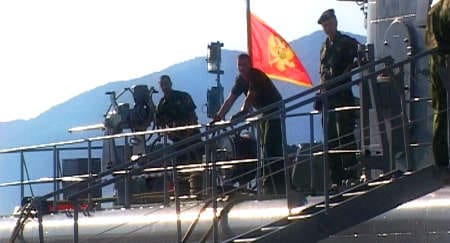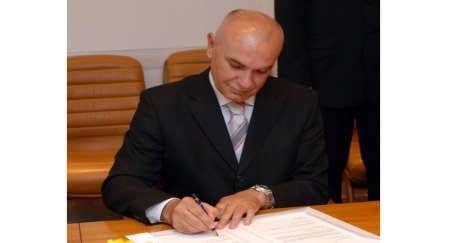Montenegro is one of Europe's newest states. One of the first issues it tackled was if - or how - to have armed forces. The country's defence minister describes how the process unfolded - and NATO's involvement.

The end result: deliberations, followed by decision and finally action has led to Montenegro having its own, new armed forces. © Ministry of Defence of Montenegro
In Montenegro’s referendum of May 2006, the country regained the independence it had initially won at the Congress of Berlin in 1878.
It is a credit to the people and governments of Montenegro and Serbia that the independence process was conducted without violence. It is normal for an event of such gravity to be accompanied by strong emotions; however, we are proud that these emotions did not spill over into conflict, and we believe that the new relationship between our countries will deepen and prosper.
As a number of NATO and PfP countries understand very well, the business of a newly independent state is replete with challenges, many of which are only discovered in the process.
One of the major decisions taken by the government of Montenegro in 2006 involved whether or not to have armed forces (AF). As a country of nearly 700,000 people, with a struggling but steadily improving economy and no imminent external threat, there were reasonable concerns raised about both the need and affordability of an AF. However, there is substantial agreement that security and stability within our region remain fragile – but also a belief that they are attainable
If one benefits from collective security, one should contribute to it. Living in a secure house cannot be rent or maintenance free.
Many within and outside the government believe that rather than Montenegro being a net recipient of security, a country has a responsibility to contribute to security and stability, both within the region and beyond. If one benefits from collective security, one should contribute to it. Living in a secure house cannot be rent or maintenance free.
By extension, it was decided that a Montenegrin defence establishment would provide not only an element dedicated to national defence and crisis response, but also to defence cooperation within the region, as well as beyond, that would contribute to enhanced security and stability.
It would be disingenuous, and at odds with the reality in any government, to imply that there was consensus in the decision to create a defence establishment with a modest (approximately 2,400) AF; however, the decision was taken, inspired by the success of defence cooperation among NATO nations for so many decades. A goal was established to learn from their success, and contribute to its sustainment.
In the period immediately following the referendum, a small number of senior military officers, formerly members of the Armed Forces of the Union of Serbia and Montenegro, began the task of forming the AF of Montenegro. By November 2006, Montenegro had established its first Ministry of Defence (MOD).
The MOD was created from, in essence, a blank sheet. It required all the essential legal and regulatory frameworks, as well as defence planning and budgeting systems, along with the associated policies and procedures.
The term ‘defence reform’ has become so common that nearly everyone uses it to refer to our MOD; however, the reality is that the MOD is ‘forming’ rather than ‘reforming’ in Montenegro.
The same is not entirely the case for the military; there are reforms ongoing within the military, in parallel with the formation of the AF. A number of the regulatory frameworks, systems and policies within the AF are based on those that were in use within the Union AF of Serbia and Montenegro. Our AF are deeply engaged in adapting these legacy systems, bringing about a transition to best democratic practices.
As the process of building a professional AF continues, we are beginning to see the rewards in more competent leadership, more effective training, and a force with higher morale. The pride of the AF is increasing, and importantly, so is the pride of the people of Montenegro in their AF. We expect this trend to continue as our engagement in the Partnership for Peace (PfP) process increases, and with the assistance of NATO and other international partners.
In terms of security and stability, we realise that our region is not yet ‘out of the woods’.
We also understand that the success of any organisation depends largely upon its people. The MOD has employed a number of young people, nearly all with good English language skills. We have also made the best use of our military officers, by bringing a number of the experienced ones into the MOD staff. There, beyond their functional duties, they assist the staff that have had no association with the requirements of a defence establishment.
Establishing democratic oversight of the armed forces and best democratic practices within the ministry are mutually reinforcing efforts.
Earlier this year the MOD submitted its first Annual Report to Parliament, detailing MOD activities in its first year of existence. The ministry is in the process of introducing additional initiatives, such as the creation of effective mechanisms to enhance communications between the MOD and Parliament on a regular basis.
Just as it is necessary for the MOD to be aware of - and respond to - the information needs of Parliament, it is equally necessary for Parliament to develop its knowledge of the defence establishment: where we are going, how we intend to get there, what resources are necessary and why. Our initiatives are intended to address both these needs.
To address the issue of improving support for NATO membership among the people of Montenegro, a Communications Strategy aimed at informing the public on the costs and benefits of membership was created in late 2007. We are beginning to see successful results from the activities associated with this strategy, and are intensifying our efforts in this essential area.
The government of Montenegro decided from the earliest days of contemplation of independence that it would play a role in the effort to create durable solutions to security challenges in Montenegro, in the region, and beyond - to the extent our resources will allow.
It was also clear to us that within NATO, countries work together, pool resources and develop policy through consensus to enhance the security of all members. Our decision to seek an invitation to PfP, and ultimately full membership in NATO, was not a snap decision.
We were well aware of the contribution the Alliance has made to peace, security, stability and prosperity in Western Europe. We also knew that, even though a number of significant differences had arisen between NATO member countries over the years, compromises were made and differences resolved. That process seemed to strengthen collective defence and security.
We could see that security and stability provided a necessary platform for economic development, for increased foreign and domestic investment, and for a continuing trend of social wellbeing in member countries.
The government of Montenegro wants a better future for its people, a future of peace, security and stability, and improved social and economic wellbeing. While we are not yet fully certain of every detail of the costs of membership in NATO will incur, we remain painfully aware of the costs of insecurity, instability and the ravages of war in our region. We are dedicated to ensuring that these latter costs are never again borne by our people.
In terms of security and stability, we realise that our region is not yet ‘out of the woods’. But along with those in the region of a like mind, we feel that the most promising path includes NATO membership.
The NATO Summit in Bucharest in April 2008 represented a positive milestone for Montenegro in our quest for peace and stability in the region. We were pleased with NATO leaders’ acknowledgement of Montenegro’s success to date in PfP.
PfP has provided Montenegro with an opportunity to benefit from NATO’s nearly two decades of experience in assisting countries transforming to democratic systems of government, including the experience of NATO and PfP countries. The lessons learned in this process have been invaluable to Montenegro in focusing its efforts - not only in the reforms underway within the military, but also in the development of our new Ministry of Defence.
The willingness of NATO, its member countries and other PfP countries to assist Montenegro, in a true partnership, is at the very core of the success of the Alliance. Our challenge is to effectively manage assistance according to our priorities, without overwhelming our staff’s capacity to absorb this assistance.
We are under no illusions. The tasks ahead will not be easily or quickly accomplished.
We are, however, committed to this effort in the firm belief that, regardless of Montenegro being a small country, it possesses the potential to make a contribution, and we intend to exercise that potential to make a positive difference.
We are under no illusions. The tasks ahead will not be easily or quickly accomplished.

